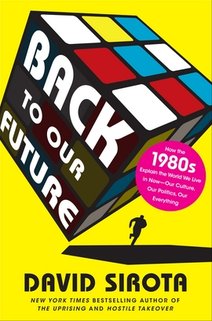
17 Mar 2011 05:10:37
Those carefree years spent sitting idly and naively by as a cabal of ill-willed corporate leviathans and backward-looking governmental decision-makers put their stamp on a society whose seemingly innocuous, kitschy pop culture masked a me-first, militaristic outlook that is having negative ramifications in the 21st century.
Whatchoo talkin' `bout, Sirota?
It's an oversimplification of Sirota's thesis, but the journalist and radio host's book, "Back to Our Future: How the 1980s Explain the World We Live in Now — Our Culture, Our Politics, Our Everything," is indeed about what he sees as a return to 1980s-style themes and mindset in today's society.
Look no further, Sirota says, than the "greed is good" ethos of "Wall Street" villain Gordon Gekko playing itself out in the massive swindle by Bernie Madoff. Or, he says, witness President George W. Bush swooping down on an aircraft carrier "Top Gun"-style to proclaim victory in his dogfight against a squadron of Soviet warplanes — er — the Iraqi army.
"Now today, almost every major cultural touchstone is rooted in the 1980s — whether obviously or subtly," Sirota writes.
More in Entertainment
The New Royals: Insight on Prince William & Kate Middleton's wedding
Full coverage of the royal wedding on Yahoo! News
Complete entertainment coverage
"Back to Our Future" is thought-provoking and worth reading — if, that is, you're willing to suspend a little disbelief.
Let's say for the sake of argument that the 1980s are making a comeback. How, then, is that any different than the 1970s channeling their inner `50s in the form of "Happy Days," "Grease" or Richard Nixon?
American culture is cyclical, and history tends to repeat itself regardless of place. Of course, the events and attitudes of the 1980s are having an impact in 2011. The same could be said about the 1960s, 1970s or 1990s, for that matter.
Still, Sirota's book is a fun, engaging read if not taken too seriously.
After all, the guy spends paragraphs wondering why average citizens could track down "The A-Team," yet the U.S. Army couldn't, and debating the merits of the Statue of Liberty-as-movable-object ending of "Ghostbusters II."
As the noted `80s historian Ferris Bueller once said, "Life moves pretty fast. If you don't stop and look around once in a while, you could miss it."
Or, in Sirota's worldview, even if you missed the 1980s the first time around, you'll see them now virtually everywhere you look.
Whatchoo talkin' `bout, Sirota?
It's an oversimplification of Sirota's thesis, but the journalist and radio host's book, "Back to Our Future: How the 1980s Explain the World We Live in Now — Our Culture, Our Politics, Our Everything," is indeed about what he sees as a return to 1980s-style themes and mindset in today's society.
Look no further, Sirota says, than the "greed is good" ethos of "Wall Street" villain Gordon Gekko playing itself out in the massive swindle by Bernie Madoff. Or, he says, witness President George W. Bush swooping down on an aircraft carrier "Top Gun"-style to proclaim victory in his dogfight against a squadron of Soviet warplanes — er — the Iraqi army.
"Now today, almost every major cultural touchstone is rooted in the 1980s — whether obviously or subtly," Sirota writes.
More in Entertainment
The New Royals: Insight on Prince William & Kate Middleton's wedding
Full coverage of the royal wedding on Yahoo! News
Complete entertainment coverage
"Back to Our Future" is thought-provoking and worth reading — if, that is, you're willing to suspend a little disbelief.
Let's say for the sake of argument that the 1980s are making a comeback. How, then, is that any different than the 1970s channeling their inner `50s in the form of "Happy Days," "Grease" or Richard Nixon?
American culture is cyclical, and history tends to repeat itself regardless of place. Of course, the events and attitudes of the 1980s are having an impact in 2011. The same could be said about the 1960s, 1970s or 1990s, for that matter.
Still, Sirota's book is a fun, engaging read if not taken too seriously.
After all, the guy spends paragraphs wondering why average citizens could track down "The A-Team," yet the U.S. Army couldn't, and debating the merits of the Statue of Liberty-as-movable-object ending of "Ghostbusters II."
As the noted `80s historian Ferris Bueller once said, "Life moves pretty fast. If you don't stop and look around once in a while, you could miss it."
Or, in Sirota's worldview, even if you missed the 1980s the first time around, you'll see them now virtually everywhere you look.

